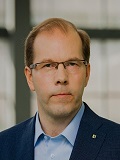Department of Civil Engineering and Architecture, Tallinn University of Technology, Tallinn, Estonia.
Interests:
Zero energy buildings; Ventilation; Indoor climate; Building simulation; HVAC; Data driven energy and IEQ analyses
Website:
Bio:
Jarek Kurnitski is a Professor at Tallinn University of Technology, Estonia, and at Aalto University, Finland. He is internationally renowned for preparation of technical definitions for nearly zero energy buildings through many activities in REHVA and European standardization. He is Chair of REHVA Technology and Research Committee and led REHVA COVID-19 Task Force preparing European HVAC and ventilation guidance with 300 000 downloads worldwide. In WHO ECAP he contributed to the development of WHO Ventilation Roadmap and in Group 36 he was one of scientist providing evidence on SARS-CoV-2 airborne transmission. He has been working in expert groups of CEN, WHO, CIB, ISIAQ and REHVA, preparing international evidence-based guidelines, standards and textbooks for healthy, comfortable and energy efficient buildings, incl. preparation of EPBD 1st and 2nd generation standards in CEN TC 156, TC 89, TC371 and TC228. Kurnitski has been deeply involved in the work to improve the energy efficiency of the built environment in Estonia and Finland with major contribution in the development of dynamic simulation-based energy calculation frames for present regulations. He has been recognized with highest scientific awards from professional associations SCANVAC (2000, 2024), REHVA (2005, 2024), and Estonian state research award (2018).


